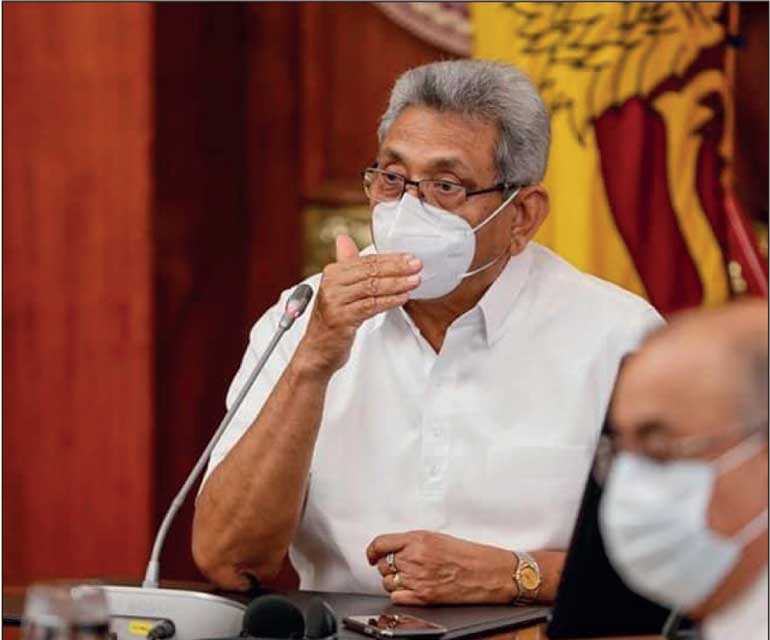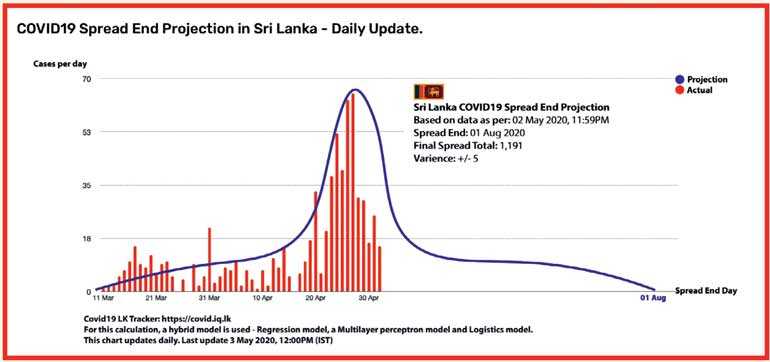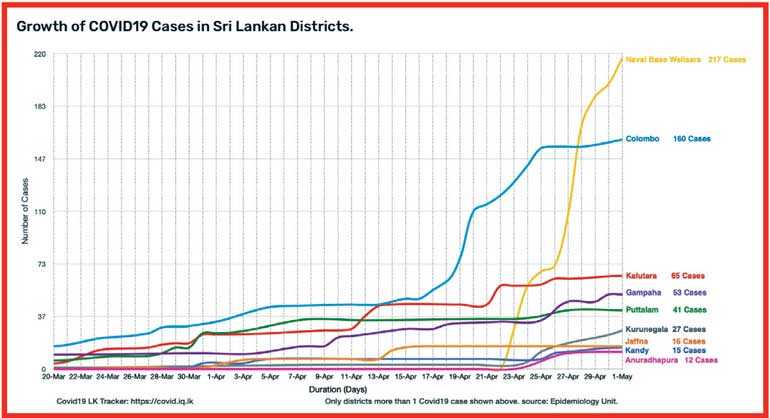Thursday Feb 19, 2026
Thursday Feb 19, 2026
Thursday, 7 May 2020 00:00 - - {{hitsCtrl.values.hits}}



The month of April was undoubtedly was one of the toughest times we have been faced with our lives. Challenged to get our basic food to the table from fresh vegetables, bread and meats. Not being able to go to office or step out of the home. Having a question mark on the person bringing the groceries, not  being able to visit our parents and friends, has pressured our life.
being able to visit our parents and friends, has pressured our life.
Service above self
However, some of us live on the ethos ‘Service above self’ out and got a permit to get back to work. This attitude enabled us to keep the people who work in our offices to continue with their lives.
Leaving aside the emotions surrounding the COVID-19 virus, if we look at the hard data, last year’s GDP growth was around 2.3% but the companies we served had a good year with volume growths of around 20%.
Hence the Central Bank estimate for 2020 for Sri Lanka to be at 1.5% GDP means that the downward swing cannot have such ramifications that many envisaged at the outset of the pandemic. This statement will hold ground unless the CBSL data is flawed. Even if we take the World Bank forecast at -0.3% for this year means that Sri Lanka technically cannot see a major swing.
Poverty trap
A fact that we tend to forget is that many households in the South Asian countries tend to have a tendency for the population to be clustered around the poverty threshold. Hence the current 0.8 million population is on the poverty trap and unless Sri Lanka opens the country for business this population can shoot up to 1.3 million if the unemployment level goes up by 10%. Which is the biggest challenge that Sri Lanka will have to deal with than the spread of the COVID-19 virus.
The logic being that even with the current spread, the maximum number of patients that can contract the COVID-19 virus is estimated at 1,144 people with a fatality rate of 1% as at today’s data. Which means that poverty will be bigger challenge for the Government than containment of the COVID-19 virus.
Hammer and dance
This is why in the theory of ‘Hammer and Dance’, with the use of intelligence a country identifies the clusters where the COVID-19 virus is propagating and goes in for a lockdown of 21 days, 35 days or 49 day models to manage the situation. It is said that Israel has demonstrated the best in using this technique and now Sri Lanka has mastered this.
Research reveals that once the virus spread is curtailed by the ‘Hammer’ approach, the curfew is subsequently relaxed to allow the economy to ‘Dance’ – meaning to allow the companies to work and get the economy to kick start again.
The good news is that the tea industry is receiving strong demand in the last two weeks whilst the apparel industry is seeing new demand models like the case of the Singapore Government channelling the manufacturing of PPE to Sri Lanka. But we must accept that the apparel industry will have challenging times financially.
Money or bodies
Whilst the theory of Hammer and Dance may sound interesting in the management of an economy threatened by the lethal virus COVID-19, one of the most difficult decisions that leaders of the world will have to make is when does a country relax the lockdown and allow the economy to get started.
It is very sad but the ultimate decision will be based on the maths of a country. Meaning, if a country is open for business like what we see in the United States, the economy will function but the bodies also pile up. Which is why the US President is estimating 300,000 people to die from COVID-19 virus when the current deaths are only at 67,447.
The US President has the power to go for a total lock down and save lives of people in the United States but then the economy will sink. Which is why President Trump has decided to balance the number of bodies whilst allowing the economy to continue functioning. It’s the toughest decision a leader has to make for the people of that respective country.
If we go to brutal statistics the US fatality rate is at 7% whilst India it is at 3.7% and Sri Lanka at below 1%. Hence, if one wants to predict the deaths in Sri Lanka an algorithm can be computed based on the current spread as at today. The essence is who will be in the number that adds up to the 1% will be the million dollar question.
New skill set
If we leave the COVID-19 virus management for a while and focus on the last month’s private sector performance of Sri Lanka. In my view we saw a new set of leaders emerging in our companies and in society. Let me share my observations on this new breed of leaders that demonstrated their ability to perform in a chaos environment.
I guess this might be the new norm in the country post COVID-19. Let’s accept it, there will be a stark difference in the pre-COVID and post-COVID times in Sri Lanka. Which calls for a different set of skills in the near normal Sri Lanka.
1) Quick decision makers
A key characteristics of the performers of last month was the ability to adapt to the new situation and take quick decisions. The opportunities were thrown in the market place and the companies that were quick time movers grabbed the opportunities. Meaning survival was not for the fittest but the fastest. This skill will hold ground in the next three months too given that the COVID-19 virus is estimated by algorithms to wean off by early August 2020 as per the graph.
This ‘ quick adaptation and first mover advantage’ requires the ability to gather data and quickly move through the decisions making process knowing that someone else can take that opportunity if one is a split second late. Let’s accept it the business environment last month was ruthless and very competitive. This trend will continue in the near future.
2) Forced entrepreneurship
The second skill that we saw among the winners last month was the ability to take decision without perfect data. Meaning that there was a risk on the decisions taken. People were forced to be entrepreneurs.
Meaning all the studying and structural decision making was thrown out of the door and people who had the streak of entrepreneurship inside them, tend to get a customer than those who tried to follow protocols and complex procedures.
Companies which had this maturity realised made a conscious decision to allow people to innovate and make mistakes and move on. Think about it as we look back at last month we were forced entrepreneurs. You many have not known, now let’s develop on this base skill.
3) Don’t wait for others to act.
A very important skill that I saw was that real winners did not wait for others to move and do task but ventured out did them by them self. So the leader of new normal Sri Lanka was a cashier, delivery boy, driver and sales rep sometimes. To be honest all of us were sales driven as we wanted the revenue to cover the costs.
So, remember in the near normal Sri Lanka job descriptions and titles will be thrown out of the door. People who got the job done will remain and thrive. Part of my work revolves around the largest fast moving companies in Sri Lanka and I saw in real life how a new set of leaders was emerging.
4) Add value or shut up
We are in war with an unseen enemy. If you cannot add value to a discussion, then shut up. The logic being that, this is not the time for small talk but adding to an idea and building it to be a ‘business model’. Hence, you must take time and read and watch TV or Google the net to be conversant on a topic. Then, naturally you will become an important player in the company or social group. So remember past success and reputation is less important today. Sri Lanka need people who can add value.
5) Comfortable with technology
Let’s accept it, technology is not our best friend. However, competent you are the fact remains that last month things were changing very quickly. So you must learn to change as the world is moving very fast. Don’t worry about the connection, go ahead and get on to that Zoom conversation or the WhatsApp conversation on video which you may be not very comfortable with. Do that electronic transfer of money. The world is getting safer on ecommerce. You actually have no choice.
6) Working out
The last point I want to share is that people who were labelled continued performers last month were people who kept fit. They somehow found a way to do a run/walk down the neighbourhood, or enter an online ‘cross fit’ group. Working out moved from a life style to a necessity. It’s a new attitude that you must inculcate or you will burn out.
What next
To wrap up: No one knows how the future will pan out for Sri Lanka. All I know is that each of us has a key task – ‘protect people’s lives’. We must move our organisations to a ‘COVID-19 controlled environment’.
Rotary has set the stage by driving pilot projects in diverse economic sectors together with the Sri Lanka Standards Institute (SLSI). Let’s remodel as the world has changed. It will never go back to the original entity it was.
(The writer is the CEO of a regional Artificial Intelligence (AI) company for Sri Lanka, Maldives and Pakistan. The thoughts are strictly his personal views.)